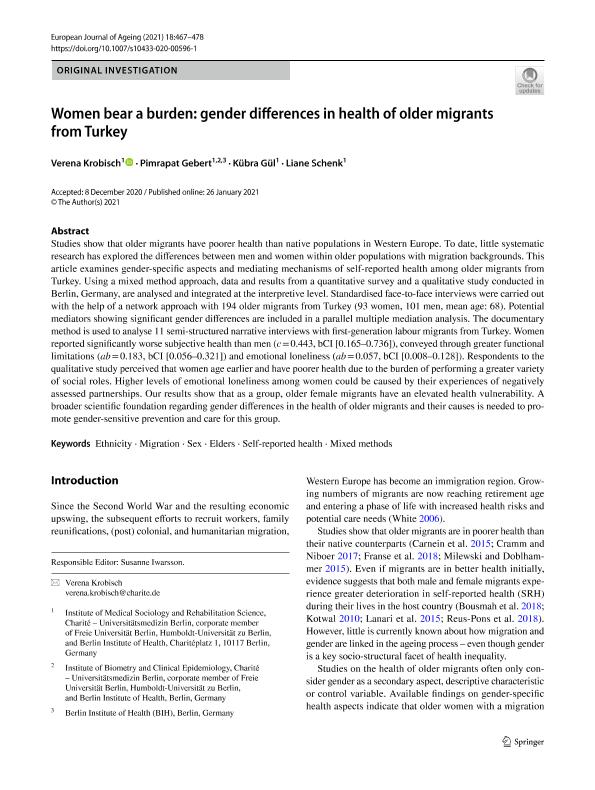| LDR | | | 00000cab a2200000 4500 |
| 001 | | | MAP20210031984 |
| 003 | | | MAP |
| 005 | | | 20220911210959.0 |
| 008 | | | 211104e20211101gbr|||p |0|||b|eng d |
| 040 | | | $aMAP$bspa$dMAP |
| 084 | | | $a931.2 |
| 100 | 1 | | $0MAPA20210035203$aKrobisch, Verena |
| 245 | 1 | 0 | $aWomen bear a burden$b: gender differences in health of older migrants from Turkey$cVerena Krobisch, Pimrapat Gebert, Kübra Gül, Liane Schenk |
| 520 | | | $aStudies show that older migrants have poorer health than native populations in Western Europe. To date, little systematic research has explored the differences between men and women within older populations with migration backgrounds. This article examines gender-specific aspects and mediating mechanisms of self-reported health among older migrants from Turkey. Using a mixed method approach, data and results from a quantitative survey and a qualitative study conducted in Berlin, Germany, are analysed and integrated at the interpretive level. Standardised face-to-face interviews were carried out with the help of a network approach with 194 older migrants from Turkey (93 women, 101 men, mean age: 68). Potential mediators showing significant gender differences are included in a parallel multiple mediation analysis. The documentary method is used to analyse 11 semi-structured narrative interviews with first-generation labour migrants from Turkey. Women reported significantly worse subjective health than men (c?=?0.443, bCI [0.1650.736]), conveyed through greater functional limitations (ab?=?0.183, bCI [0.0560.321]) and emotional loneliness (ab?=?0.057, bCI [0.0080.128]). Respondents to the qualitative study perceived that women age earlier and have poorer health due to the burden of performing a greater variety of social roles. Higher levels of emotional loneliness among women could be caused by their experiences of negatively assessed partnerships. Our results show that as a group, older female migrants have an elevated health vulnerability. A broader scientific foundation regarding gender differences in the health of older migrants and their causes is needed to promote gender-sensitive prevention and care for this group.
|
| 540 | | | $aLa copia digital se distribuye bajo licencia "Attribution 4.0 International (CC BY 4.0)"$f$uhttps://creativecommons.org/licenses/by/4.0$943 |
| 650 | | 4 | $0MAPA20080544690$aMujeres |
| 650 | | 4 | $0MAPA20100044407$aPersonas mayores |
| 650 | | 4 | $0MAPA20080578848$aAnálisis de datos |
| 651 | | 1 | $0MAPA20080637972$aTurquía |
| 700 | 1 | | $0MAPA20210035210$aGebert, Pimrapat |
| 700 | 1 | | $0MAPA20210035227$aSchenk, Liane |
| 700 | 1 | | $0MAPA20210035234$aGül, Kübra |
| 773 | 0 | | $wMAP20210024146$tEuropean Journal of Ageing : social, behavioural and health perspectives$dCham, Switzerland [etc.] : Springer International Publishing AG, 2021-$g01/11/2021 Volumen 18 Número 4 - 2021 , p. 467-478 |
| 856 | | | $qapplication/pdf$w980$yRecurso electrónico / Electronic resource |


